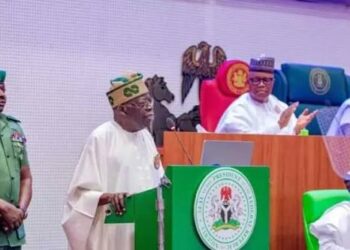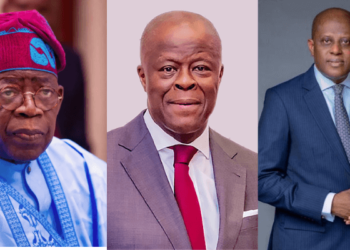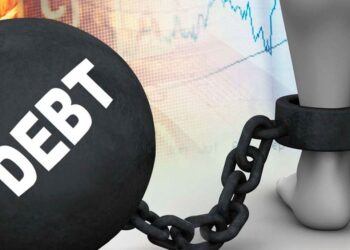John Omachonu
As predicted by some analysts Nigeria’s inflation rate rose again to 19.64 percent in July, which is 1.04 percent higher than June inflation rate of 18.6 percent.
The figure released by the nation’s Bureau agancy, the National Bureau of Statistics (NBS) is the sixth consecutive monthly increase and also the highest since September 2005.
The continued spike in inflation largely reflects the combined effects of exchange rate pass-through and the surge in diesel prices.
Despite the decline in global commodity prices, Nigeria’s food and core inflation surged, reflecting persistence of domestic inflation-stoking factors such as exchange rate and energy prices.
The increased transportation and logistic costs resulting from the surge in diesel price continue to elevate food inflation, which is the major driver of the headline inflation
Bismark Rewane, chief executive of Financial Derivatives Company, (FDC) had predicted a 19-year high of 19.7 in July.
As usual, the increase was recorded against the backdrop of food inflation, which rose to 22.02 percent in July from 20.60 percent in June.
The rise in the food index was caused by increases in prices of bread and cereals, food products, potatoes, yam and other tubers, meat, fish, oil, and fat
But some analysts continue to differ with NBS on the actual or real figures of inflation that have succeeded in separating most consumers from their favourite dishes as well as breakfast.
This is because some of them query the figures, which they claim, could be misleading, considering the devastating effect on consumers’ wallets anddinning tables because the hypothetical figures may not be subject to empirical base period.
For instance, in January, it peaked at 15.60 percent, shot up to 15.70 percent in February and by March, it had climbed to 15.92 percent.
The month of April experienced the same trajectory rising to 16.82 percent, then to 17.71 percent in May and 18.60 percent in June, making it the eighth highest on the African continent
NBS had always noted in its reports that most of the items affected by the monthly increase in prices are usually the staple ones like bread, oil, yams and potatoes which serve as breakfast, particularly, for the lower income earners.
Most worrisome, they further argue, is the fact that the rate of increment in their prices in the market is more than what the agency reports monthly.
According to Lagos based energy analyst, Friday Ameh, the figures doled out by the nation’s bureau of statistics may not be real considering the actual prices of goods and services that have been on the rising trend on daily basis.
Although, Ameh may not be doubting the figures, but insists that they are not the true representation or reality when one considers them along the actual prices of food items in the markets.
“In dealing with data, timeliness and situations matter, because, in the case of inflation figures, data collected today might change even the following day or week, because of the dynamic nature of the society and the fact that infrastructure decay could affect transportation by way of time of delivery and fundamental changes that may have happened along the line,” he said.
According to Rewane, “published data may be inaccurate as there is no consensus about the actual level of inflation in the country and actual price is much higher.”
As FDC puts it, “headline inflation came in at 18.6 per cent in June. Our expectations (are) that it will increase further to 19.25 per cent in July. Anecdotal and empirical evidence at times diverge due to different sample size (national vs Lagos survey) (and) time lags.
According to the firm, “Nigeria’s Consumer Price Index (CPI) Basket is redundant,” having been last reconstituted 13 years ago (2009).
It stated that the CPI basket ought to be reviewed every five years, as a number of things such as, demography, population and behavioural patterns, have changed.
He argued that for the data to be reliable, the basket from which the prices of items are calcu;lated for establishing inflation figures must have to be reconstituted, at least every five years.
For instance, he said that Official inflation rose by 0.89% to 17.71% in May, however, “data does not reflect market reality, as inflation will be much higher (45.64%) if the basket was reconstituted. Our synthetic basket shows 84.09 percent.
In reality, basket reconstitution is Masking the True Picture (45.64%), as according to some analysts, Nigerians would not have real inflation figures until necessary actions, like, reconstitution of the basket is encouraged.
Giving reasons for the action, the foremost economist said, “Weights of the CPI basket ought to be reviewed every 5 years to reflect, changing household consumption patterns, Covid-19 and its attendant economic shock which altered spending patterns and changing demographic composition.”
Giving empirical figures and using November 2009, when the CPI basket was last reconstructed as the base year, Rewane said, for instance that food and non-alcoholic beverages, which had 51.8 as the inflation figure for the base year would have proposed weight of 55.54.
Also, Education with 3.94 should have proposed weight of 6.04; Health with 3.004, to have 6.52, while Housing, water, Electricity, Gas, with 16.73 would however have 10.72.
Further analysis showed that the most potent factors in the inflation variable are money supply & exchange rate.
Consequently and based on the Central Bank of Nigeria report that money supply (M2) grew by 25.51 percent in May, Growth Domestic Product forecast of 3.11 percent and exchange rate pass through of 22.11 percent, then the annual inflation for May, 2022 would have been 44.51 percent as against the official inflation record of rising by 0.89% to 17.71percent
The analysts say the current lack of synergy between the activities of CBN in its monetary policy measures and Federal Ministry of Finance, Budget and National Planning in its fiscal policy measures would make it difficult for a common policy at reigning in inflation.
For instance, according to CBN, money supply: Jan=N44.3b; Feb=N44.74;March=N45.66;April=N47.21;May=N48.56b
Similarly and for an import dependent economy where most states depend solely on sharing from the Federation account monthly, the circle of poverty continues.
This is despite the dwindling resources as reflected in the monthly distributable pool.
FAAC: Jan=N699b; Feb=N574.66b;March=N590.55b;April=N725.57b;May=N656.6b
For instance, FAAC disbursement went down 9.51percent to N656.6bn in May despite higher oil prices, an indication that all is not well with the economy.
Also, there was the alleged zero remittances from NNPC due to petrol subsidy payments, which president Muhammadu Buhari said during his interview with Bloomberg that:
“Unorthodox policies are working” “Naira would have crashed if not for top policies”
“Nigerians are better off today than in 2015”
“Subsidy removal is good in theory but it is impractical”
Due to these contradictions in policies Nigeria has not been able to benefit from the general decline in food prices.
The global food price index declined for the fourth consecutive time in July, hitting a 4-year low of 140.9.
It is expected that the moderation in US inflation, which eased to 8.5 percent in July will have a knock-on effect on global inflation.
This is because the US is the world’s largest economy with 25% of global output of goods and services.
With MPR hike as the only way out for most central banks, Nigeria’s central bank (CBN) may have to wait for the GDP numbers expected to be published on August 26, for any likely action on the anchor interest rate.
If the numbers are positive, the MPC may be reluctant to increase the interest rates in its next meeting scheduled to hold in September 2022.
However, the FDC pointed that inflation is not a “Nigerian specific problem” given that inflation is currently at 40 – year highs in advanced economies.
It noted that virtually all central banks, including the Central Bank of Nigeria (CBN) are trying to stem inflation with monetary tightening (hiking interest rates).
Rewane, a member of President Muhammadu Buhari’s Economic Advisory Council, further observed in this month’s LBS Breakfast Session some of the nagging questions on the lips of frustrated and disgruntled consumers.
His words: “we broke with the routine and shared with members baffling questions that were common to our respondents in the survey.
According to him, the questions reveal a thread of frustration, desperation and near hopelessness on the part of consumers who after denying themselves of other necessities of lives, have not been able to cope with the rising cost of food items.
ALSO READ:Blackout Looms As Electricity Workers Begin Strike Wednesday
Some questions on the lips of most Nigerians now are, what is the true & actual level of inflation in Nigeria, what is the best form of hedge against inflation, Could the crisis in the foreign exchange market with the attendant embarrassing exchange rate of the naira to other currencies, particularly, dollars be inflation induced?
Other areas of concerns for which most consumers are asking questions include, Could relative good performance in the real estate have anything to do with inflation and foreign exchange, Could investments in Nigerian equities or money market instruments save the situation or purchase of precious metals like gold, diamond, among others?
The analysts believe that the recession fears seem to be growing fastly due to widespread economic slowdown, spiraling inflation, induced monetary tightening, frightening depreciation of naira.
Other worrisome signals are existing multiple exchange rates and discriminatory forex market, heightening insecurity that has displaced farmers from their farmlands and rising CBN’s credit to the federal government through Ways and Means.
They also include high debte levels, rising poverty and unemployment.
The banking sector is not left out as disturbing signals are also emerging.
Interbank money market rates already surging, will test 18 percent p.a. – 20 percent p.a, while total outstanding at the CBN discount widow may reach N1.5trn this quarter.











